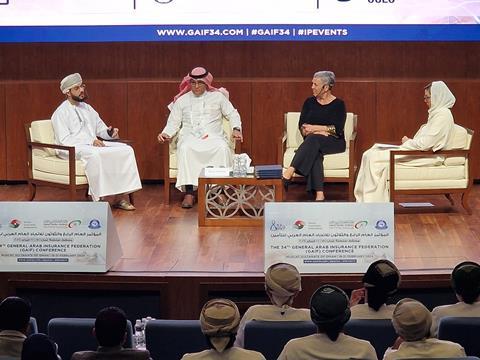Saudi Re is using technology to drive its ESG strategy, while speakers agreed on the need for top-down ESG strategy to align with overall strategy and to emphasise the business case of ESG.
Environmental, social and governance (ESG) was the focus of a panel debate at the General Arab Insurance Federation (GAIF) conference underway in Muscat.

Speakers promoted ESG as a force for stronger performance for insurance companies, by improving culture hand-in-hand with innovative technology efforts.
The 34th GAIF conference is being held in Oman, with more than two thousand delegates from insurance companies across the Middle East and beyond descending on Muscat, more than two decades after the city last played host to GAIF in 2002.
“I’m inspired by the speakers, about what you are already are doing, and even more so about your vision,” said Katja Rieger, a non-executive board member of Swiss Re and CEO of Ripple Effect, a consulting and training firm.
She urged productivity gains as a primary rationale for ESG, citing opportunities as well as risks to manage, adding that “not doing ESG is wasteful”, Rieger said.
“ESG is important to all of us, and you know what, I don’t even have to make the point, ESG makes business sense,” she said.
She cited scandals in recent years, such as the reputational cost of Germany’s emissions scandal of car manufacturers falsifying diesel pollution numbers.
“If you’re doing good business, responsible business, this is not going to happen. But more importantly, ESG is about opportunities as well,” Rieger said.
A presentation from Saudi Re, emphasised that the reinsurer is integrating ESG into its reinsurance operations, particularly through technology, citing Accenture research on the role of technology in furthering ESG.
“The next question is how to leverage technology and ensure sustainable business operations,” said Isa Ali, chief strategy and technology officer, Saudi Re.
For Saudi Re, innovation within the valuation chain consists of “four pillar” technologies: advanced analytics and artificial intelligence; the internet of things; process automation; and insurtech platforms.
“The challenges inherited by adapting ESG considerations will not be the last. There’ll be always challenges facing us,” he said.
“It is expected from us as insurance professionals and risk experts to come with innovative ideas to enable us confront challenges and meet stakeholders’ needs. Technology and innovation can be a key strategy to boost productivity, efficiency and ESG goals simultaneously,” Ali added.
Asked by moderator Hasan Al Lawati, CEO of Oman Qatar Insurance Company on terms for successful ESG, Rieger urged making ESG part of business strategy, rather than a separate strategy.
“By giving it to the CEO and the board to be responsible as the sponsors, everybody in the company takes it on, and if you make that part of your business, it’s not going to be quite as effortful as it may seem,” she said.
There is a risk of embarking on ESG as “a branding exercise”, Rieger warned, and that this can backfire, emphasising that efforts should be about genuine cultural change with the right aims in mind.
Rieger also encouraged insurance firms to take a lead, rather than waiting for regulators to push them.
“Early adopters have a huge advantage, because they gets a reputation for it. Anybody following later, will be driven by compliance with regulation…You can be the early adopters and reap the rewards for all the effort you’re taking,” she said.
Mistakes will happen and are a learning opportunity, she noted, “and frankly the rules are changing”, she added.
Discussion turned to key performance indicators (KPIs) amid demand to quantify gains relative to efforts involved.
“We try to make sure that our projects are centred around health, safety, innovation, education, and bringing awareness into the society,” said Hanaa Al Hinai, CEO of Liva Insurance, Oman.
This includes offering health insurance clients wellness checks for staff, she explained, lobbying issues such as wellness and road safety, and involving police and other stakeholders.
It also includes HR taking a more proactive approach to training and educating staff, she emphasised.
“If you take care of the staff, I think everything else will fall into place,” Hinai added.
BLOG: GAIF OMAN 2024
- 1
- 2
- 3
- 4
- 5
- 6
 Currently reading
Currently readingESG: business sense, culture and innovation focus – GAIF34 panel
- 7
- 8

















No comments yet